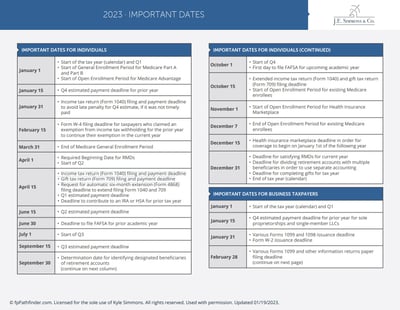Market volatility and uncertainty is spiking due to concern with the banking system and outlook for the economy and interest rates.
A brief timeline of events:
Fed Chairman Powell Testifies Interest Rates May Need to Rise.
March 6 - 7: Federal Reserve Chairman Powell provided testimony to Congress regarding inflation and the Fed's intent to continue raising interest rates because of persistent inflation. Stocks drop on news that interest rates may continue to increase.
Banking Trouble for the Banks in the Tech Sector.
Silvergate Bank and Silicon Valley bank both acted as niche banks for technology and crypto companies.
March 8: Silvergate Bank failed. Silvergate was a small bank that primarily catered to the crypto industry and didn't have much impact on markets because of its small size.
March 8: Silicon Valley Bank is a bank primarily for tech startups and venture capital firms. Silicon Valley Bank announces they had to sell a portion of the investment holdings at a loss and is seeking to raise more funding.
March 9-10:
-
Venture Capital Firms tell their portfolio companies to start withdrawing from Silicon Valley Bank which kicks off the bank run.
-
Silicon Valley Bank accountholders withdraw $42B in assets and forces the government to intervene to protect depositors.
Over the weekend, the Federal Reserve announces they will make Silicon Valley Bank depositors whole, even if deposits were over the FDIC limit of $250,000.
Silicon Valley Bank was Unique in Banking.
First, most of SVB's customers were tech companies that received large cash deposits as investments from venture capital firms. 2021 and 2022 were big years for tech investment, so SVB had a lot of idle cash they had to loan out or invest. SVB's cash growth was not normal and was largely due to the near zero interest rates of 2021 and early 2022.
Next, SVB bought long-term government bonds in 2022 with customer deposits. In theory these are safe investments, but long-term bond investments got clobbered in 2022 due to rapidly increasing interest rates.
Last, 86% of its deposits were not FDIC insured so the depositors had incentive to withdraw quickly when bank failure became a possibility.
Here is a chart from JP Morgan's Chairman of Market and Investment Strategy, Michael Cembalest. See how SIVB (bottom right red dot) compares to other banks. SIVB stood by itself with mostly business accounts and a large investment and loan portfolio.

The federal government's response to this failure is to protect the deposits for all depositors, even if above the $250,000 threshold. They appear determined to avoid a banking crisis.
Is the Federal Reserve done increasing rates?
When the Federal Reserve raises interest rates, they are trying to reduce inflation (used cars should not appreciate, right?) and limit bubbles (hi, crypto). The troubles in the banking system may cause the Federal Reserve to pause or reduce interest rate hikes to see how the banking situations develops.
If you are on the Fed Board, would you suggest higher rates when it may cause more bank stress? I think it's more likely the Fed pauses or only does one small increase.
The chart below shows how the 10-year treasury rate started to fall when the bank failure news came out on March 8. Essentially, the market is expecting lower rates than they thought last week.
.png?width=2000&height=1253&name=I10YTR_chart%20(1).png)
Recession in Tech and their Banks
"Only when the tide goes out do you discover who's been swimming naked." - Warren Buffett
I think we should expect more "naked swimmers" to show up in the news over the next year as higher interest rates continue to impact businesses.
My favorite case study is Zoom vs. Hilton over a three-year period. Zoom was creating a "new way to work" but failed to maintain the hype and is up 1.8% over three years. "Old school" cash cow Hilton hotels is up 25% over three years. I'm not suggesting you buy Hilton, but only contrasting two different styles of stock. (Credit to Ryan Graves at Bemiston Asset Management for the specific example)
.png?width=2000&height=1364&name=ZM_HLT_chart%20(3).png)
Crypto, technology stocks, banks for tech, and other market participants that relied on near-zero interest rates will have to succeed in this new interest rate environment.
Takeaways from this Week for Long Term Investors
Long-term investors have the benefit of looking beyond the current events. We cannot figure out every twist and turn of the next few months but know that the government is determined to protect the banking sector.
We will likely emerge from this volatile period with slow growth, lower inflation, and lower rates.
This is the same environment we had before COVID and is generally positive for long-term investors in stocks and bonds.
In times like this it's important to think long term about investing, remain diversified, and try to ignore a majority of the financial news media.
Sources:
JP Morgan - Eye on the Markets
Other Resources:
Schwab CEO on CNBC Addressing Market Conditions
Silicon Valley Bank is Toast - Who Else is Getting Burned?
SVB is Bankrupt - What Really Happened
